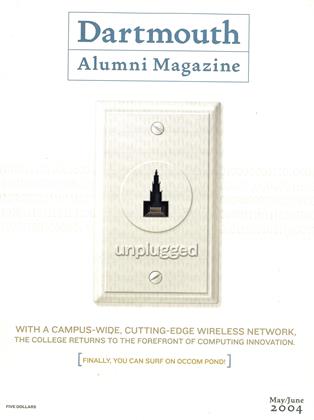IN HIS 1972 BOOK, MAN AND THE COMPUTER, FORMER DARTMOUTH PRESIDENT JOHN KEMENY INCLUDED HIS PREDICTIONS FOR THE FUTURE OF COMPUTING. HOW WELL DID HE DO AS A SEER? HERE'S A QUICK TALLY.
PREDICTION: "I fully expect that with-in the next generation we will seecomputer memories capable ofholding the contents of the largest library in the world." OUTCOME: Hit. Online libraries havearrived.
PREDICTION: "It should be possible,using a touch-tone phone, to type aperson's name and address andhave the telephone company's computer locate the number and makethe call."
OUTCOME: Miss. Kemeny had theright idea but the wrong technology.
PREDICTION: "The next decade islikely to see the development ofhuge computer networks." OUTCOME: Hit. Networks were intheir infancy in 1972, but within adecade networking became thewave of the future.
PREDICTION: "I am confident that by 1990 millions of Americans will have the ability to do significant research in their homes. Homeowners would buy terminals that cost as little as a black-and-white television and log on to one of nine strategically placed computation centers."
OUTCOME: Hit and miss. By 1990 ordinary people could find all kinds of information online without leaving home. But Kemeny was wrong about using terminals to connect to one of nine computation centers.
PREDICTION: "I do not expect a spectacular increase in the speed of computers. It is perfectly reasonable to assume that by 1990 they will be 10 times as fast as they are today."
OUTCOME: Miss. Twenty-five years after Kemeny made his prediction, computers were 2,250 times faster than they were in 1972.
PREDICTION: "I want to argue that it is entirely feasible for The [NewYork] Times to provide personalized service for each of its readers." OUTCOME: Hit. Customized newsletters, papers and portal pages are part of the daily routine of millions of people.
PREDICTION: "Businesses could keep their inventory inside the memory of a computer, and any customer in the region could carry out a simple computerized search to find out what is actually available in a given store." OUTCOME: Hit and miss. Kemeny got the online inventory part right. He didn't anticipate the likes of Amazon.com selling to anyone, anytime, anywhere on the planet.
PREDICTION: "A computer system could control all the traffic lights in Manhattan and base its decision on current information on traffic flows
and traffic jams." OUTCOME: Hit. In major metro areas computerized traffic control systems have increased the capacity of highways without adding lanes.
PREDICTION: "I predict that a dramatic effect on the pattern of employment and the location of offices will come about by the widespread use of video telephones." OUTCOME: Hit. Although video telephones aren't needed by today's telecommuters, Web-based teleconferencing with webcam video is already here and growing fast.
 View Full Issue
View Full Issue
More From This Issue
-
 Cover Story
Cover StoryThe Great Disconnect
May | June 2004 By ED GRAY ’67, TU’71 -
 Feature
FeatureThe Defector
May | June 2004 By Matthew Mosk ’92 -
 Feature
FeatureYou Can’t Always Give What You Want
May | June 2004 By ALICE GOMSTYN ’03 -
 Feature
FeatureAmazing
May | June 2004 By Cynthia-Marie O'Brien '04, CHRISTOPHER BERG '89 -
 Article
ArticleNewsmakers
May | June 2004 By MIKE MAHONEY '92 -
 Sports
SportsStraight Shooter
May | June 2004 By Ed Gray ’67, Tu’71
Lee Michaelides
-
 Article
ArticleThe Sages of Hanover
MARCH • 1987 By Lee Michaelides -
 Feature
FeatureLife on Campus Is Slated for an Overhaul
June 1987 By Lee Michaelides -
 Article
ArticleMaking an Instrument called a "Horror"
SEPTEMBER 1987 By Lee Michaelides -
 Article
ArticleThe Professor
SEPTEMBER 1987 By Lee Michaelides -
 Cover Story
Cover StoryThe Stuff of Art
October 1992 By LEE MICHAELIDES -
 ARTIFACT
ARTIFACTCase Study
July/August 2012 By Lee Michaelides







